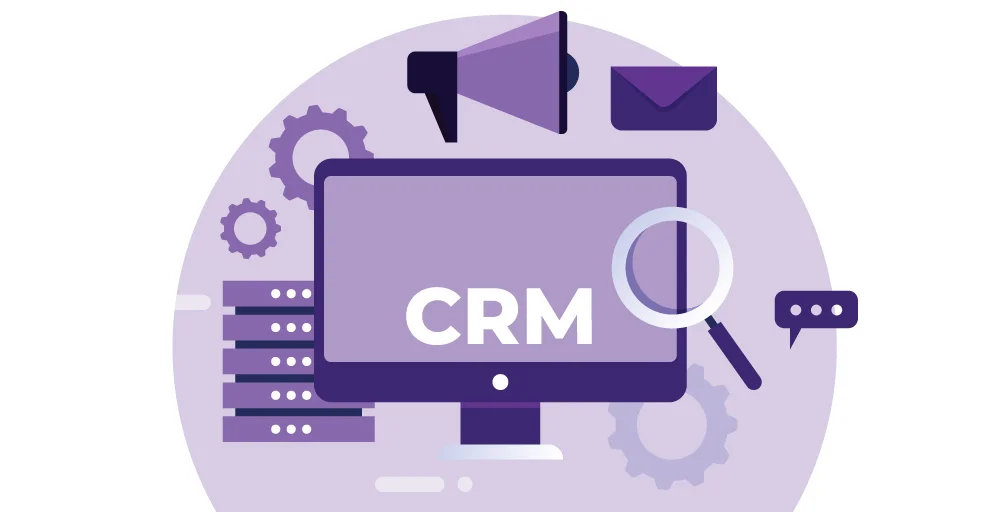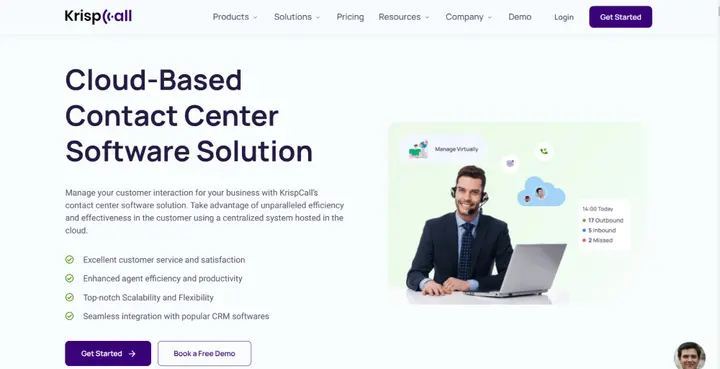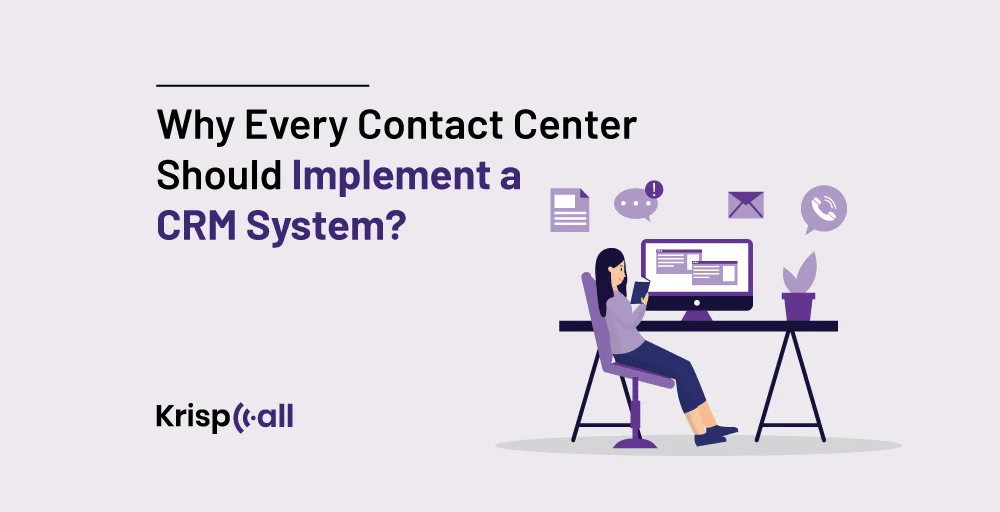In the modern, customer-centric business world, most contact centers face the challenges of 😠unstructured data, complicated processes, and minimal visibility. This results in dissatisfied clients and exhausted employees.
The answer to all these problems is a customer relationship management (CRM) system 😀that can maintain the contact center operation. A CRM system offers a unified approach to sourcing customer data in one location, sending messages, and delivering customized, fast service.
This guide will explore the benefits and step-by-step guide to implementing a CRM system in your contact center. You will also learn why every contact center should implement a CRM system for your business.
🔑 KEY HIGHLIGHTS
- CRM software helps customer service reps manage their relationships with existing and potential customers.
- Implementing CRM in a contact center offers benefits such as boosting customer loyalty, integrating operations, and generating valuable insights.
- Integrating the KrispCall Contact Center with different CRM programs can streamline operations, data-driven systems, and more.
- Businesses can integrate their CRM to foster a more personalized customer experience.
What is a CRM System?

CRM, or Customer Relationship Management System, is an application that helps businesses manage their interactions with customers and prospective customers. It is used as a central database to store and access consumer data, operate and enhance sales and marketing procedures, and improve customer support. CRM’s benefits for customer support and service includes enhanced customer interactions, streamlined support processes, and increased customer satisfaction.
The function of CRM incorporates the following:
- Contact management: Contact management allows for the storage and management of detailed data for customers, prospects, and contact interests, including name, location, contact, communication history, and preferences.
- Lead management: It helps to keep track of your pipeline and handle it from beginning to end, including lead creation and conversion. Lead scoring, nurturing, and automatic connections are all part of it.
- Sales automation: CRM systems enable automating numerous sales tasks, including creating and sending quotes, proposals, and invoices, scheduling appointments and follow-ups, and many more.
- Marketing automation: Frequently integrated with multiple marketing tools, CRM systems help create campaigns and conveniently manage them, monitor performance, and segment your audience based on various aspects.
- Reporting and analytics: With CRM, you can generate comprehensive reports on sales performance, customer behavior, and marketing campaign effectiveness. In addition, you can also gain valuable insights into customer data to identify trends, opportunities, and areas for improvement.
Benefits of implementing a CRM system in the Contact Center
The benefits of implementing a CRM system for the contact center include improved customer service, efficient operations, and increased sales.
Besides that, there are some key benefits of CRM systems:
- Improved customer experience: CRM system provides agents with all the information they need to provide clients with the best possible service. This software aids in personalizing the interaction and developing a relationship with the client by understanding the client’s unique needs and preferences.
- Streamlined operations: When all of your data and contact routes are in one location, your system can swiftly and efficiently portray customer history, inclinations, and behavior. This ensures that agents have a reliable and timely solution when clients clamor for support, which means they don’t have to waste time retrieving crucial information.
- Data-driven insights with CRM system: Most CRM software generates live reports. It brings data into a single easy user interface, saves your data to the cloud, and gives insight into what your customers want and how your response rates are across customers.
- Flexibility and scalability: Modern CRM systems are flexible and scalable and can be adjusted to any company’s unique needs. They easily integrate with existing tech stacks and allow for the addition of new features and tools to accommodate the growing volume of customers, communication channels, and team members.
- Increased sales: CRM systems give agents access to a complete view of customer data, helping them identify cross-selling and upselling opportunities. In addition, the CRM system automates several tasks, allowing agents to focus solely on closing more deals with prospects.
How to implement a CRM system in your contact center?

Implementing a CRM system in your contact center can be challenging. But following some simple steps can make it effortless.
Here is how to implement a CRM system in your contact center:
1. Define your goals
The first prominent aspect of CRM is why you need the tool and what you want to get from it. It’s essential to clearly define goals that guide your selection process and ensure the chosen CRM aligns with your contact center’s specific needs.
In addition, understand the basic functionalities that your agent must need to succeed. Consider features like call logging, customer data management, activity tracking, and reporting tools.
2. Select the right CRM system
After clearly defining your goals, it’s time to explore various call center CRM solutions, each with unique strengths and functionalities. Evaluate each CRM solution’s features, pricing plans, and ease of integration with your existing contact center software.
For better results, choose cloud CRMs, which offer several benefits such as scalability, accessibility from any device, and automatic updates. But remember that the chosen CRM system must fit your budget and business needs.
3. Data migration and integration
Once you choose the right CRM system for your contact center, you must migrate your existing customer data from your current system to the new CRM. You need to have clean and accurate data for optimal CRM functionality.
This real-time data exchange empowers agents with up-to-date customer information during interactions, leading to more personalized and efficient service.
4. Train your team
Training your team on how to use a CRM system is vital for the success of the system. Include training as part of your CRM implementation plan and opt for a hands-on method to guarantee everyone is comfortable using it.
Depending on your approach, providing firm training might also be a good idea. Additionally, consider offering regular training courses on new features and ideal methods to ensure that the system offers you all the help it can and is tailored to your specific business needs.
5. Monitor, Analyze, and Refine
Once you have successfully integrated CRM with your contact center, you can monitor key metrics like call resolution time, customer satisfaction scores, and sales conversation rates. Analyzing this data helps you assess the CRM’s impact on your contact center’s performance and identify areas for improvement.
What are the things to consider when choosing the right CRM system for your contact center?
Choosing the right contact center CRM software for your business is a major decision that should not be taken lightly. Here are a few things to keep in mind while choosing the CRM system:
- Scalability: Scalability is the main aspect you must consider while choosing your business’s CRM system. The right contact center CRM will scale with your business to continue meeting your needs, be it the size of your business, your customer base, or the service channels they use.
- Integration: If you have to work with multiple systems, you’re making it much more difficult for your agents to resolve complex customer issues that intersect multiple interactions and products. Instead, ensure your chosen CRM system seamlessly integrates with your existing tools. That way, you can deliver personalized customer experiences and quickly identify and address issues.
- Ease of use: Always choose software that is user-friendly to use. This helps agents to easily understand the interface and functionalities, reducing the learning curve of the software. In addition, you also don’t have to train much for new employees.
- Analytics and reporting: Your customer number is growing, employee turnover is high, and customer problems and inquiries are becoming more complicated. Customer support organizations need data more than ever. The right contact center CRM will provide you with essential data on the status of your customer service organization.
Unlock the Power of CRM with KrispCall Contact Center

Unleash your contact center’s full potential with KrispCall Contact Center and CRM integration. This dynamic duo streamlines workflows by providing agents with instant access to complete customer data within KrispCall.
This eventually translates to faster issue resolution, happier customers, and boosted sales through upselling opportunities. In addition, it also empowers agents, improves agent performance, and breaks down communication silos, all while gaining valuable insights to optimize your customer experience.
KrispCall contact center with CRM integration enables you to transform your contact center, drive efficiency, and unlock the true power of customer connections.
Some of the Unique features of KrispCall contact center integration are:
- Automated contact management
- Automation
- Chat and call recording
- Click-to-call capabilities
👉 Book your free demo today and see how CRM integration can transform your KrispCall contact center.
Conclusion
CRM systems are essential for any contact center that wants to succeed in the modern era. This software helps you deliver personalized service to customers and manage lead data efficiently without errors.
However, choosing the right CRM system is essential. Before selecting, consider whether the CRM is scalable, integrates with your existing tools, or is easy to use. Considering these things helps you select the perfect CRM that truly meets your business needs. Utilizing the appropriate CRM system enables you to enhance the customer experience significantly.
While searching for a Contact Center, we recommend you go with KrispCall Contact Center, as it offers many advanced features and integrates with many CRM systems like HubSpot, Pipedrive, Microsoft Dynamic 365, and many more. It provides 24/7 customer human support and is affordable to invest in.





